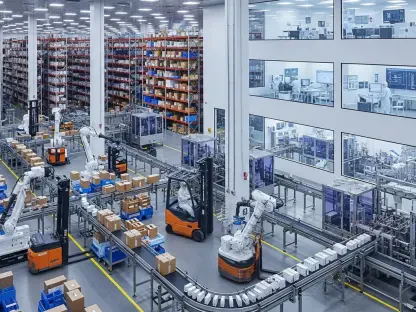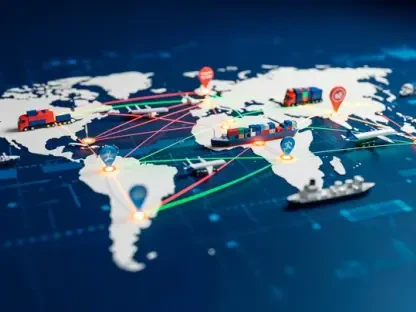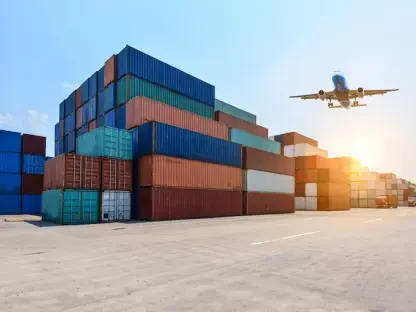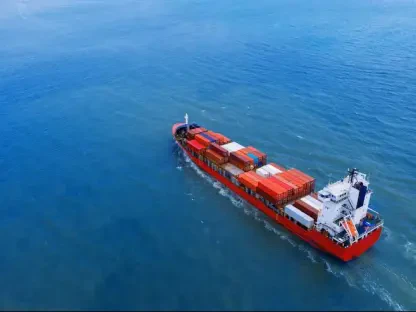Hyundai Rotem has taken a monumental step in transforming the automated logistics landscape, particularly at South Korea’s Gwangyang Port. Recently, the company secured an 82.8 billion won contract from the Yeosu Gwangyang Port Corporation to produce and deliver automated guided vehicles (AGVs). These AGVs represent a pivotal advancement in logistics automation technologies, aimed at increasing efficiency to unprecedented levels. The unmanned vehicles will be tasked with autonomously loading and transporting cargo, streamlining the operations of one of Asia’s busiest ports.
Revolutionary AGVs for Gwangyang Port
Custom-Built for Port Use
Under the terms of the contract, Hyundai Rotem will supply 44 large AGVs specifically designed for port logistics. These vehicles will not operate in isolation; they come as part of an integrated system that includes control systems and high-speed chargers. Each AGV stands out due to its substantial size, measuring 16 meters in length, 3 meters in width, and 2.3 meters in height, and is capable of carrying containers weighing up to 65 tons. Fully powered by electricity, these vehicles can function for up to eight hours on just a 30-minute charge, thanks to their advanced fast-charging technology.
The substantial dimensions and capabilities of these AGVs mark a significant upgrade in the automation of port logistics. The integration of these vehicles is aimed at reducing human workforce requirements and minimizing errors associated with human intervention. With this project targeted for completion by 2029, Hyundai Rotem sets an ambitious timeline to completely revolutionize the port’s logistics infrastructure. Each AGV will be part of a synchronized system designed to optimize the flow of cargo from arrival to dispatch.
Advanced Technology and Safety Features
Equipped with state-of-the-art technologies, these AGVs are engineered for stable, driverless operation. Real-time vehicle positioning is made possible through antennas mounted on the AGVs and sensors embedded in the port floor. This allows for precise navigation around the port’s expansive terrain. Additionally, LiDAR sensors installed on both the front and rear of the vehicles are integral for obstacle detection and collision prevention, ensuring that efficiency does not come at the cost of safety.
Hyundai Rotem’s proprietary AGV control system further enhances operational efficiency by coordinating the movement of multiple AGVs, even in complicated logistics environments. This advanced control system is crucial for handling the complex and dynamic nature of port operations, where high volumes of cargo must be moved swiftly and accurately. The ability to automate these processes helps in minimizing delays, thereby improving overall productivity.
Hyundai Rotem’s Broader Initiatives in Logistics Automation
Expanding Expertise
Since establishing a dedicated smart logistics office in 2020, Hyundai Rotem has been intensely focused on building its expertise in logistics automation. Their expanding portfolio includes not just AGVs, but also Autonomous Mobile Robots (AMRs) and automated warehouses. The company’s commitment to innovation is further demonstrated by its deployment of AGV-dedicated production lines and extensive testing facilities at its Dangjin factory. These production capabilities ensure that each AGV meets stringent performance standards before being deployed.
Past projects serve as a testament to Hyundai Rotem’s technological prowess in automation. One notable success is the installation of 60 AGVs and related infrastructure at Busan’s Pier 7. This project provided valuable insights and laid the groundwork for more ambitious undertakings like the current project at Gwangyang Port. By consistently refining its technology and expanding its product offerings, Hyundai Rotem aims to set new benchmarks in the logistics automation sector.
Commitment to Research and Development
Hyundai Rotem’s strong emphasis on research and development has been a cornerstone of their strategy to lead the logistics automation market. The company continually invests in upgrading its technologies to ensure its solutions are at the forefront of the industry. The integration of cutting-edge technologies like LiDAR, real-time positioning systems, and proprietary control systems underscores the company’s dedication to providing comprehensive automation solutions. This consistent focus on R&D enables Hyundai Rotem to stay ahead of industry trends and anticipate future market needs.
Additionally, Hyundai Rotem’s collaboration with various stakeholders, including government bodies and private enterprises, further enhances its capability to deliver top-notch automation solutions. These partnerships not only provide additional resources but also enable the company to pioneer in the field of port logistics automation. With a strong R&D foundation and collaborative ecosystem, Hyundai Rotem is well-positioned to drive the industry forward.
The Future of Automated Port Logistics
Full Automation and Efficiency
The overarching trend in modern port logistics is a concerted push towards achieving fully automated systems for higher efficiency and streamlined operations. Hyundai Rotem’s extensive experience and continuous development of advanced logistics technologies make it a frontrunner in this evolving landscape. Through the Gwangyang Port project, the company aims to set a new standard for port operations worldwide. By eliminating manual labor elements and integrating sophisticated autonomous systems, ports can operate more efficiently and at a reduced operational cost, which is crucial in a fiercely competitive global market.
The successful implementation of automated logistics processes also carries significant environmental benefits. The electric-powered AGVs not only reduce dependency on fossil fuels but also contribute to lower carbon emissions, aligning with broader global sustainability goals. Hyundai Rotem’s fast-charging technology further ensures that these vehicles are both time and energy-efficient.
Leading the Market
Hyundai Rotem has made significant strides in revolutionizing automated logistics, especially at Gwangyang Port in South Korea. The company recently garnered an 82.8 billion won contract from the Yeosu Gwangyang Port Corporation to develop and supply automated guided vehicles (AGVs). These AGVs signify a major leap forward in logistics automation, intended to vastly boost efficiency. By autonomously loading and transporting cargo, these unmanned vehicles aim to streamline operations at one of Asia’s most bustling ports.
The incorporation of AGVs marks a critical shift towards more efficient and technologically advanced methods for handling cargo, significantly reducing manual labor and speeding up the logistics process. The deployment of these automated vehicles is expected to have a profound impact on the overall productivity and operational efficiency of Gwangyang Port, setting a new standard for ports around the world. This advancement not only highlights Hyundai Rotem’s innovative capabilities but also underscores the growing importance of automation in global trade and logistics.









